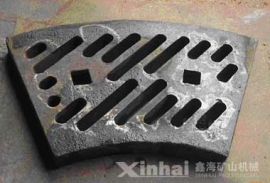Common sulfide iron ore is known as pyrite, marcasite, and pyrrhotite, widely in various types of deposits. At present, the pyrite processing solution is generally dominated by flotation and supplemented by gravity separation.
According to the different properties of pyrite, a single process of gravity and flotation or a combined process of gravity and flotation can be used for recovery.

Use the table of contents below to navigate through the guide:
01Gravity Separation Process
Due to the limited recovery value of pyrite, it is necessary to pay particular attention to the economic rationality of the pyrite beneficiation process selecting the pyrite processing solution.
Applicable ore characteristics: pyrite ore with simple ore properties and coarser grain size.
Common equipment: jig, shaking table, spiral chute.
Advantages: simple equipment maintenance and low energy consumption.
Disadvantages: low recovery rate.
Taking the Yunfu pyrite mine as an example, coarse particles are recovered through the jig, and fine particles are recovered through a spiral chute. The high-grade sulfur concentrate can be obtained in a one-stage rough process.

02Flotation Separation Process
Applicable ore characteristics: single pyrite ore.
Agent: using xanthate as the collector, such as an ethyl xanthate, butyl xanthate, and isobutyl xanthate.
In some cases, the pyrite is oxidized to a certain degree with weakened flotability. It is necessary to add sulfuric acid, oxalic acid, and other activators to improve the recovery rate of flotation.
Applicable ore characteristics: Pyrite is co-existed with other valuable metal sulfide ore, such as chalcopyrite, galena, sphalerite, etc.
Agent: Lime, sodium sulfide, sodium humate, and other inhibitors.
Most of the time, pyrite as an impurity needs to be removed. So it is necessary to suppress pyrite during the flotation process to improve the grade of the target mineral. Generally, inhibitors are used to process pyrite in an alkaline flotation environment.
However, when pyrite with recycling value and other valuable metal sulfide ore co-exist, the activation of the inhibited pyrite must be taken into consideration. In practice, two or more activators are used in combination to activate ferric sulfate, which can often obtain better flotation results.

03Gravity-Flotation Combined Process
Applicable mineral characteristics: pyrite with the uneven particle size of mineral intercalation or fragile and easy to grind.
1. Rough grinding and classification of raw ore;
2. Gravity separation equipment to obtain a part of pyrite concentrate;
3. Flotation to process middle ores and tailings.

In a word, the choice of beneficiation solution of pyrite mainly depends on the nature of the ore. The single gravity separation method is suitable for the treatment of pyrite with coarse grain; the single flotation method is generally used to treat pyrite with fine mosaics, with noting the usage of flotation agents; the combined gravity and flotation separation is suitable to process iron sulfide ores with uneven grain size and thickness.

The choice of pyrite processing solution mainly depends on the embedded characteristics of useful minerals. A reasonable process is the main factor to reduce production costs.
The mine owner can learn from the above contents in choosing the pyrite processing solution. But in actual application, it is necessary to conduct ore beneficiation tests to determine the solution based on the analysis results.


 marketing@ytxinhai.com
marketing@ytxinhai.com  0086 13810327080
0086 13810327080 






































































































 CHAT
CHAT MESSAGE
MESSAGE







